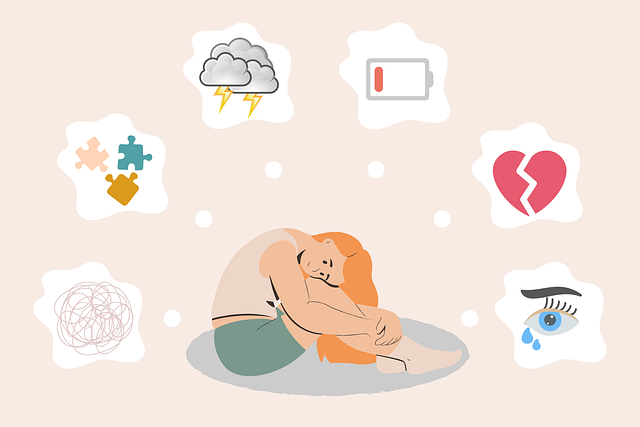Therapy for adolescent teens crisis counseling leverages the RFM (Resilience, Flexibility, Mastery) framework to equip young individuals with lifelong coping skills. By teaching communication and risk management, therapists build resilience through tailored exercises promoting self-awareness, emotion regulation, and age-appropriate strategies. Integrated coaching programs support mental wellness, while healthcare professionals suggest empathy-building activities and burnout prevention strategies for both teens and themselves. Measuring success involves tracking immediate outcomes and long-term behavioral changes using standardized assessments, ensuring a flexible approach that includes practices like Compassion Cultivation and Self-Awareness Exercises to foster self-efficacy and resilience in navigating future challenges.
Resilience is a vital asset for adolescent mental health, especially during challenging times. This article explores the power of RFM (Resilience, Flexibility, and Mastery), a transformative framework in crisis counseling sessions for teen clients. We delve into understanding the impact of RFM on young minds and its potential to enhance coping mechanisms. Through practical strategies, it guides counselors in selecting and implementing resilience-building exercises tailored to teens’ unique needs, offering hope and tools for navigating crises effectively.
- Understanding RFM and Its Impact on Adolescent Mental Health
- Identifying Resilience Building Exercises for Teens
- Implementing RFM in Crisis Counseling Sessions
- Measuring Success and Adjusting Strategies for Optimal Results
Understanding RFM and Its Impact on Adolescent Mental Health

Adolescent mental health is a critical area where the application of RFM (Resilience, Flexibility, and Mastery) principles can significantly impact young individuals’ well-being. This concept is particularly relevant in addressing the increasing rates of crisis counseling among teen populations. By focusing on these three key aspects, therapists and counselors can empower adolescents to navigate life’s challenges more effectively.
The implementation of RFM techniques in therapy for adolescent teens goes beyond traditional crisis intervention methods. It involves teaching them communication strategies that foster open discussions about their emotions and experiences. Additionally, risk management planning for mental health professionals becomes a valuable tool when integrated with RFM coaching programs. These programs aim to develop mental wellness coaching skills, enabling professionals to guide young clients toward building resilience and mastering coping mechanisms tailored to their unique needs.
Identifying Resilience Building Exercises for Teens

Identifying effective resilience-building exercises tailored for teenaged individuals is a critical step in fostering their emotional well-being and equipping them with tools to navigate challenges. Given the unique developmental stage adolescents undergo, these exercises should be designed to promote self-awareness, emotion regulation, and coping strategies that are age-appropriate and engaging. Therapy for adolescent teens, often incorporating crisis counseling techniques, can play a pivotal role in this process.
Professionals in healthcare settings, including therapists and counselors, can contribute significantly by suggesting activities that encourage empathy building and burnout prevention strategies for both adolescents and themselves. By integrating these exercises into therapy sessions, professionals can help teens cultivate resilience, enhancing their ability to cope with stress, anxiety, and potential crises. This proactive approach not only supports the teenagers’ immediate needs but also equips them with lifelong skills to navigate the complexities of adulthood.
Implementing RFM in Crisis Counseling Sessions

Implementing RFM (Resilience, Flexibility, and Mastery) in Crisis Counseling Sessions tailored for adolescent teens is a powerful approach to enhance their ability to navigate challenging situations. This strategy, often incorporated into therapy for adolescent teens, focuses on building mental wellness by fostering resilience. During these sessions, counselors utilize specific exercises that encourage young individuals to develop effective coping mechanisms. By engaging in activities designed to improve flexibility and mastery over their emotions, adolescents gain valuable tools to manage stress reduction methods and prevent crises from escalating.
The integration of RFM into crisis counseling offers a holistic approach to mental wellness coaching programs development. Through interactive discussions and practical exercises, counselors help teens identify their strengths and resources, promoting a sense of self-efficacy. This process is particularly beneficial for those experiencing emotional turmoil, as it equips them with the social skills training needed to confront and overcome crises effectively. By mastering these strategies, adolescent teens can build resilience, ensuring they are better equipped to handle future challenges.
Measuring Success and Adjusting Strategies for Optimal Results

Measuring success is a vital aspect of any resilience-building program, especially when tailored to adolescent teens in crisis counseling settings. Therapists should not only focus on immediate outcomes but also track long-term behavioral changes and emotional well-being. By utilizing standardized assessments and client feedback, practitioners can gauge the effectiveness of exercises like Compassion Cultivation Practices and Self-Awareness Exercises. Regular monitoring allows for adjustments in strategies, ensuring that the interventions remain relevant and beneficial over time.
For optimal results, a flexible approach is essential. If certain techniques prove less engaging or effective, therapists should be prepared to adapt and introduce new coping skills development activities. This iterative process fosters an environment where adolescents learn not only practical tools for managing crises but also develop self-awareness, enabling them to navigate future challenges with resilience.
The implementation of RFM (Resilience, Flexibility, and Mastery) exercises in crisis counseling sessions offers a promising approach to enhancing the mental health of adolescent teens. By focusing on building resilience, this method equips young individuals with valuable coping strategies to navigate life’s challenges. As highlighted throughout this article, understanding RFM’s impact, identifying age-appropriate exercises, and measuring success are key steps in delivering effective therapy for adolescent teens during crisis counseling sessions. This evidence-based practice has the potential to revolutionize support systems, fostering adaptability and emotional well-being among young people.









